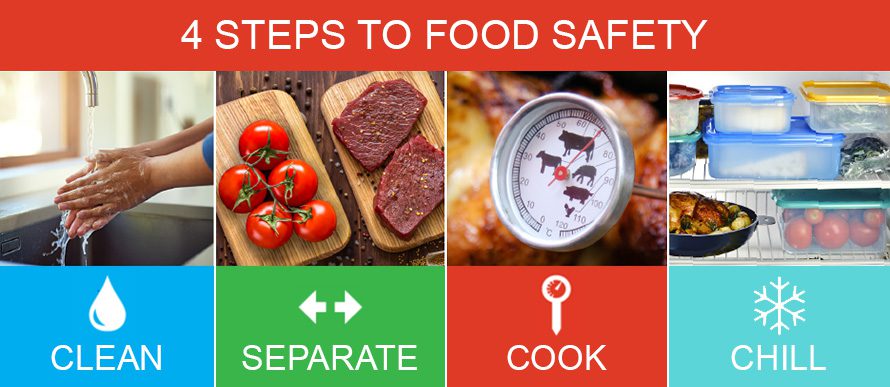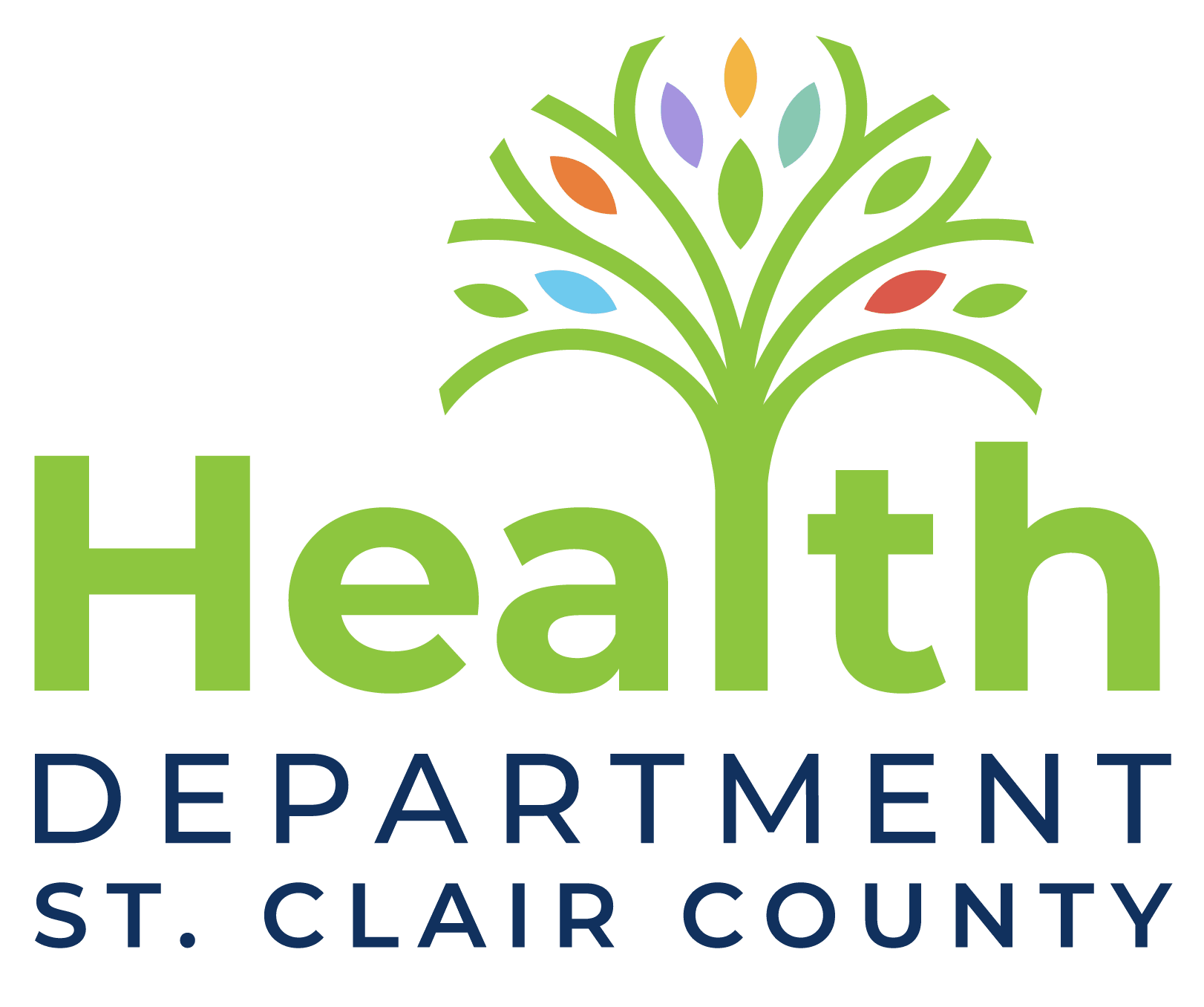
Food Safety
St. Clair County Health Department’s Food Service Sanitation Program is designed to protect public health through compliance with the St. Clair County Retail Food Establishment Code and the Illinois Department of Public Health Food Sanitation Code Part 750 to ensure safe food handling, preparation and service through routine inspections and education. The program uses educational tools, investigations and public news releases to create an awareness of problems associated with improper food handling and poor personal hygiene.
We issue permits for food service operations and retail food stores. In addition, we conduct regular inspections and complaints are investigated by department staff.
St. Clair County Health Department has a jurisdiction for all food establishments located within 18 townships. The following townships in St. Clair County fall under the jurisdiction of East Side Health District for Food Safety: Canteen Township, Centreville Township, East St. Louis Township and Stites Township. For concerns within those 4 townships, contact East Side Health District at 618-271-8722.
New Information
Recalls
Cottage Food
Basic Food Safety
Food Service Establishments
Inspections
Food Recalls
The Illinois Department of Public Health (IDPH) periodically announces food alerts and recalls related to Illinois.
National Recalls
The Food and Drug Administration (FDA) has jurisdiction over recalls involving the following: food, pet and farm animal feed.
The Food Safety and Inspection Service (FSIS) of the U.S. Department of Agriculture (USDA) inspects and regulates the following: meat, poultry products and eggs.
Cottage Food
Cottage Food Vendor Registration
The amended Cottage Food Operation Act became effective in Illinois on January 1, 2022. The Act requires Cottage Food Operations to register with local health departments before selling products to the public at a Farmers Market as well as other various locations. The new registration form and updated informational handouts from the Illinois Department of Public Health are below. If you have any questions, please contact the Environmental Health Division at (618) 233-7769.
- Starting a Cottage Food Business
- Prohibited Food List
- Cottage Food Registration Checklist
- Application for Cottage Food Operations Registration
- Food Safety Plan for Acidified and Fermented Foods
- Hazard Analysis Chart
- Sample Hazard Analysis Chart
- Cottage Food Operations Home Self-Certification Checklist
- Food Labeling and Placard
- Farmers Market Food Product Sampling Handler Certification Application
- IDPH Cottage Food Guide
- Food Handling Regulation Enforcement Act
- Cottage Food Act
Basic Food Safety

Clean: Wash your hands and surfaces often.
- Germs that cause food poisoning can survive in many places and spread around your kitchen.
- Wash hands for 20 seconds with soap and water before, during, and after preparing food and before eating.
- Wash your utensils, cutting boards, and countertops with hot, soapy water after preparing each food item.
- Rinse fresh fruits and vegetables under running water.
Separate: Don’t cross-contaminate.
- Raw meat, poultry, seafood, and eggs can spread germs to ready-to-eat foods—unless you keep them separate.
- Use separate cutting boards and plates for raw meat, poultry, and seafood.
- When grocery shopping, keep raw meat, poultry, seafood, and their juices away from other foods.
- Keep raw meat, poultry, seafood, and eggs separate from all other foods in the refrigerator.
Cook to the right temperature.
- Food is safely cooked when the internal temperature gets high enough to kill germs that can make you sick. The only way to tell if food is safely cooked is to use a food thermometer. You can’t tell if food is safely cooked by checking its color and texture (except for seafood).
- Use a food thermometer to ensure foods are cooked to a safe internal temperature. Check this chart for a detailed list of temperatures and foods, including shellfish and precooked ham.
- Whole cuts of beef, veal, lamb, and pork, including fresh ham (raw): 145°F (then allow the meat to rest for 3 minutes before carving or eating)
- Fish with fins: 145°F or cook until flesh is opaque
- Ground meats, such as beef and pork: 155°F
- All poultry, including ground chicken and turkey: 165°F
- Leftovers and casseroles: 165°F
- Microwave food thoroughly:
- Know your microwave’s wattage. Check inside the door, owner’s manual, or manufacturer’s website. Lower wattage means longer cooking time.
- Follow recommended cooking and standing times, to allow for additional cooking after microwaving stops. Letting food sit for a few minutes after microwaving allows cold spots to absorb heat from hotter areas and cook more completely.
- When reheating, use a food thermometer to make sure that microwaved food reaches 165°F.
Chill: Refrigerate promptly.
Bacteria can multiply rapidly if left at room temperature or in the “Danger Zone” between 41°F and 135°F.
- Keep your refrigerator at 40°F or below, your freezer at 0˚F or below, and know when to throw food out.
- Divide warm foods into several clean, shallow containers so they will chill faster.
- Refrigerate perishable food within 2 hours. If the food is exposed to temperatures above 90°F (like a hot car or picnic), refrigerate it within 1 hour.
- Thaw frozen food safely in the refrigerator, in cold water, or in the microwave. Never thaw foods on the counter because bacteria multiply quickly in the parts of the food that reach room temperature.
Temporary Food Sanitation Stations & Proper Food Handling
Food Service Establishments
Food Sanitation Program
St. Clair County Health Department staff provide inspection of food service facilities to promote food sanitation and consumer protection. We issue permits for food service operations, grocery stores, bars/taverns, daycares (adult and child), mobile food, or any establishment serving food to the public. In addition, we conduct regular inspections and department staff investigate complaints. Records of Food Service Sanitation Inspections are public records in accordance with the Freedom of Information Act and are available for review upon written request to our department.
How to open a new food establishment
The plan review process for Retail Food Establishment:
1) Submit the Retail Food Establishment Plan Review Application.
2) A plan review will be conducted.
3) You will receive notification of plans being approved or changes required.
4) At any time, we would be happy to conduct an on-site visit to see progress.
5) Submit a completed Retail Food Establishment Food Permit
6) Your permit will only be issued after your permit application has been completed and a pre-operational inspection is conducted.
About Food Service Establishment Inspections
(Please be advised that these inspections indicate conditions at the facilities at the time of inspection and may not represent current conditions.)
- Category 1 establishments do complex preparation of potentially hazardous foods. Potentially hazardous foods are foods that can easily support the rapid growth of bacteria that could cause disease, or foodborne illness. Category 1 establishments are inspected three times per year.
- Category 2 establishments have more limited preparation of commercially frozen or pre-prepared items. Category 2 establishments are inspected two times per year.
- Category 3 establishments have no preparation of potentially hazardous foods and only commercially packaged or prepared foods are served. Category 3 establishments are inspected two times per year.
EMPLOYEE TRAINING
What Kind of Training Do I Need?
Certified Food Protection manager (CFPM)
On January 1, 2019, the Illinois Department of Public Health adopted the 2017 FDA Food Code, which includes an update requiring the Person in Charge (PIC) of a foodservice operation to be a Certified Food Protection Manager. The PIC must be onsite at all times during operating hours in Category I and Category II establishments.
To become a CFPM, a food protection manager must attend an online or in-person* course that educates the Person in Charge (PIC) on how to receive, store, prepare, and serve food in a safe manner. A certificate is issued upon successful completion of a food protection manager course and exam. The Food Protection Manager course with exam are approximately 8 hours in length. The Food Protection Manager certificate is valid for five (5) years.
Food Handler Training
A Food Handler is any individual who works with unpackaged food, food equipment or utensils, or food-contact surfaces. All Food Handlers working in Illinois must complete Food Handler Training, unless they are a Certified Food Protection Manager (CFPM) or are an unpaid volunteer. Food Handler courses are approximately 1-2 hours in length. Food Handler Training is valid for three (3) years.
Allergen Awareness Training
With the adoption of PA 100-0367 on August 25, 2017, amendments to the Food Handling Regulation Enforcement Act were made to include an Allergen Awareness Training requirement.
If you are ever the Person in Charge (PIC) of a Category I or II establishment you must be a CFPM and must show proof of completion of additional Allergen Training. Allergen Training requirements can be satisfied by completing an online ANSI approved Allergen Training course. Allergen Training courses are approximately 1-2 hours in length. Allergen Training is valid for three (3) years.
Illinois Food Code Changes
In 2016, the Illinois Department of Public Health repealed the Illinois Food Service Sanitation Code, and adopted the FDA 2017 Model Food Code. The St. Clair County Health Department began January 1, 2019 using the FDA Food Code. Changes in the new food code will affect operating procedures for all St. Clair County food service establishments. Some of the changes include the following (any policies provided below are examples and facilities may use either these or create their own):
- Person In Charge (PIC)
- Employee Health Responsibilities
- Parasite Destruction (Raw Fish)
- Vomit and Diarrhea Clean Up Policy
- CDC Vomit and Diarrheal Clean Up Event Poster
- Handwashing Poster
Food Allergy Awareness Notice
PA101-0495 amended the Illinois Food Handling Regulation Enforcement Act, adding section 3.08 Food Allergy Awareness, effective August 23, 2019. For the IDPH “Notice to Consumers” sign, or for more information please see the links below:
Food Service Establishments
Food Sanitation Program
St. Clair County Health Department staff provide inspection of food service facilities to promote food sanitation and consumer protection. We issue permits for food service operations, grocery stores, bars/taverns, daycares (adult and child), mobile food, or any establishment serving food to the public. In addition, we conduct regular inspections and department staff investigate complaints. Records of Food Service Sanitation Inspections are public records in accordance with the Freedom of Information Act and are available for review upon written request to our department.
How to open a new food establishment
The plan review process for Retail Food Establishment:
1) Submit the Retail Food Establishment Plan Review Application.
2) A plan review will be conducted.
3) You will receive notification of plans being approved or changes required.
4) At any time, we would be happy to conduct an on-site visit to see progress.
5) Submit a completed Retail Food Establishment Food Permit
6) Your permit will only be issued after your permit application has been completed and a pre-operational inspection is conducted.
About Food Service Establishment Inspections
(Please be advised that these inspections indicate conditions at the facilities at the time of inspection and may not represent current conditions.)
- Category 1 establishments do complex preparation of potentially hazardous foods. Potentially hazardous foods are foods that can easily support the rapid growth of bacteria that could cause disease, or foodborne illness. Category 1 establishments are inspected three times per year.
- Category 2 establishments have more limited preparation of commercially frozen or pre-prepared items. Category 2 establishments are inspected two times per year.
- Category 3 establishments have no preparation of potentially hazardous foods and only commercially packaged or prepared foods are served. Category 3 establishments are inspected two times per year.
EMPLOYEE TRAINING
What Kind of Training Do I Need?
Certified Food Protection manager (CFPM)
On January 1, 2019, the Illinois Department of Public Health adopted the 2017 FDA Food Code, which includes an update requiring the Person in Charge (PIC) of a foodservice operation to be a Certified Food Protection Manager. The PIC must be onsite at all times during operating hours in Category I and Category II establishments.
To become a CFPM, a food protection manager must attend an online or in-person* course that educates the Person in Charge (PIC) on how to receive, store, prepare, and serve food in a safe manner. A certificate is issued upon successful completion of a food protection manager course and exam. The Food Protection Manager course with exam are approximately 8 hours in length. The Food Protection Manager certificate is valid for five (5) years.
Food Handler Training
A Food Handler is any individual who works with unpackaged food, food equipment or utensils, or food-contact surfaces. All Food Handlers working in Illinois must complete Food Handler Training, unless they are a Certified Food Protection Manager (CFPM) or are an unpaid volunteer. Food Handler courses are approximately 1-2 hours in length. Food Handler Training is valid for three (3) years.
Allergen Awareness Training
With the adoption of PA 100-0367 on August 25, 2017, amendments to the Food Handling Regulation Enforcement Act were made to include an Allergen Awareness Training requirement.
If you are ever the Person in Charge (PIC) of a Category I or II establishment you must be a CFPM and must show proof of completion of additional Allergen Training. Allergen Training requirements can be satisfied by completing an online ANSI approved Allergen Training course. Allergen Training courses are approximately 1-2 hours in length. Allergen Training is valid for three (3) years.
Illinois Food Code Changes
In 2016, the Illinois Department of Public Health repealed the Illinois Food Service Sanitation Code, and adopted the FDA 2017 Model Food Code. The St. Clair County Health Department began January 1, 2019 using the FDA Food Code. Changes in the new food code will affect operating procedures for all St. Clair County food service establishments. Some of the changes include the following (any policies provided below are examples and facilities may use either these or create their own):
- Person In Charge (PIC)
- Employee Health Responsibilities
- Parasite Destruction (Raw Fish)
- Vomit and Diarrhea Clean Up Policy
- CDC Vomit and Diarrheal Clean Up Event Poster
- Handwashing Poster
Food Allergy Awareness Notice
PA101-0495 amended the Illinois Food Handling Regulation Enforcement Act, adding section 3.08 Food Allergy Awareness, effective August 23, 2019. For the IDPH “Notice to Consumers” sign, or for more information please see the links below:

Food Inspection Program
The St. Clair County Health Department’s food protection program follows a risk-based inspection approach, with an emphasis on eliminating Foodborne Illness Risk Factors – the violations which are more likely to lead to consumers getting sick. Environmental Health staff follow the conditions outlined in the Illinois Food Code (PDF) and Illinois Food Code Part 750 to determine compliance with best practices and to educate food establishment employees during routine, unannounced inspections. Food Establishments with a higher relative risk of causing foodborne illness (based on the large number of food handling operations, vulnerable populations served, or special processes conducted) are inspected more frequently than food establishments with a lower relative risk of causing foodborne illness. Additional information on violations, inspection frequency, and inspection look-up are found below.
For more information on trainings and opening a restaurant in St. Clair County go to the Food Sanitation Program page.
Food Establishment Inspections
Please be advised that inspections only provide a snapshot of a food establishment’s practices, as they are based on what is seen at the time of the inspection. If an establishment does not do well during an inspection, Health Department Staff work to educate the food establishment workers to assist with preventing repeat violations.
Inspection Schedule
The general yearly inspection schedule is as follows:
- Category I — 3 inspections
- Category II — 2 inspections
- Category III — 2 inspections
Compliance and follow-up (recheck) inspections are conducted as needed in addition to the routine inspections. During any type of inspection, Health Department Staff work to educate food establishment employees as to why certain practices are not acceptable and how these practices can contribute to food-borne illness.
Inspections
There are 58 items or categories under which violations may be written when conducting a food inspection. These violation categories are divided into Foodborne Illness Risk Factors and Good Retail Practices.
- Foodborne Illness Risk Factors are those violations which have a higher likelihood of contributing to a foodborne illness such as improper cooking and hot/cold holding temperatures and poor employee hygiene.
- Good Retail Practices are violations of basic operational and sanitation conditions such as leaking faucets, missing light shields, etc.
Risk Factor violations and Good Retail Practice violations are also divided into three categories: Priority, Priority Foundation, and Core.
- Priority items are violations that can contribute directly to foodborne illness if not controlled. For instance, not cooking chicken to 165 degrees.
- Priority Foundation items are violations that could contribute to Priority violations if not controlled such as not having a calibrated metal stem thermometer to take the temperature of the chicken.
- Core violations relate to general sanitation, operational controls, sanitation standard operating procedures (SSOPs), facilities or structures, equipment design, or general maintenance. For instance, the floor that an employee is standing on to take the temperature of the chicken is dirty.
There is no score. Food Establishments will be given the number of Risk Factor Violations and Risk Factor Repeat Violations.
